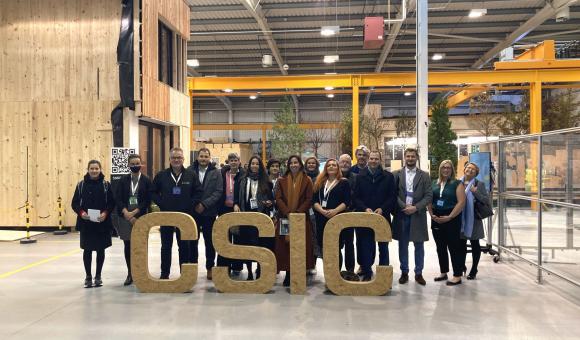Although COP 26 has just ended with mixed results, the Walloon contribution to the debates and the integration of local and international economies into the challenges of sustainable development have allowed several advances that can be summarised in three words: hydrogen, green building & the circular economy. A presentation of the Walloon actions and issues involved in and around COP 26.
Green hydrogen and green building. These are undoubtedly two of the most important sectors that are currently enabling Wallonia to contribute to global efforts to reduce CO2 emissions and combat climate change. Indeed, the importance of the new economic opportunities created by taking sustainable development into account in companies' international development strategies really becomes evident here. And these are the opportunities that Wallonia wanted its companies to be able to take advantage of during the mission and the international conference.
Green building & the circular economy between Wallonia and Scotland.
Alongside its participation in COP26 (see below) in Glasgow, the Wallonia Export-Investment Agency (AWEX) organised a mission to present and promote the Walloon ecosystem in sustainable construction technologies. With the Eco Construction, CAP Construction, GreenWin and TWEED clusters, a dozen Walloon companies (AGC Glass, BEAL International, BSolutions, Gramitherm, Isohemp, Home Eos, Hostellerie des paraboles, Purifungi, WSL) presented their technologies to Scottish construction operators such as Construction Scotland. The aim was to develop their business and products in the region and promote the Walloon biosourcé label, a source of inspiration for Scotland, which wants to strengthen the circular economy in its construction sector.
"We organised a number of B2B meetings for our companies and of course we hope that this will lead to contracts," explained Maxime Couvreur, Economic and Commercial Advisor at the Wallonia Export-Investment Agency, Birmingham. The Eco Construction and Construction Scotland clusters have also developed closer ties because Construction Scotland is interested in the biosourcé label used in Wallonia to showcase the work of their companies working using short channels."
The economic mission was mainly centred around visits and meetings at the Construction Scotland Innovation Centre, the National Manufacturing Institute Scotland, the Circularity Capital investment fund which should help operators to raise capital in the coming years, the Queens Cross Housing Association (sustainable social housing), Low Carbon Home (COP26 HOUSE) and finally Balfour Beatty, the United Kingdom's largest construction company, which currently undergoing a sustainable transition to zero carbon technologies.
A conference, introduced by the Walloon Minister of Energy and Mobility, Philippe Henry, and presented by Jean-Pascal van Ypersele, Belgium's representative on the Intergovernmental Panel on Climate Change (IPCC), during which he explained the role that the construction industry must play in reducing CO2 emissions, and Bertrand Piccard, founder of the Solar Impulse Foundation, aimed to expound (again) the challenges that climate change poses to our societies and the solutions that companies, including those involved in the mission, can provide.
Why Scotland?
The choice of Scotland was not exclusively related to the fact that COP26 was held in Glasgow.
There are other reasons that pushed the Wallonia Export-Investment Agency to organise this mission in the region. "The Scottish Government has a £3.4 billion plan over 5 years to renovate their building stock and improve energy efficiency. This will boost their market and generate opportunities for construction companies,"explains Maxime Couvreur. "As they will favour the greenest possible solutions, there are opportunities for our companies for which they can logically qualify. COP26 was an opportunity for our companies to showcase their solutions to an international panel of experts and business operators and use their participation at this event to increase their international credibility."
Wallonia promotes its expertise in green hydrogen at COP 26
During the Glasgow Climate Change Conference (COP26) held from 1 to 13 November 2021 in Glasgow, Scotland, the Wallonia Export-Investment Agency's Birmingham office organised a seminar at the pavilion of the International Organisation of La Francophonie (IOF) on a future technology in which the region can demonstrate experience and a strong business ecosystem: green hydrogen.
Belgian-Moroccan agreement in green hydrogen
This event was the result of a joint initiative by Morocco and Wallonia to present the potential of green hydrogen in achieving the Sustainable Development Goals within the IOF. The Walloon government is relying on this new technology to facilitate the transition of its heavy industry into a low-carbon industry in order to reach its goal of carbon neutrality by 2050. Morocco, for its part, sees the production of green hydrogen as a source of economic development that generates jobs and social well-being. The programme highlighted how Walloon manufacturers help to achieve the respective objectives of the IOF member countries by developing innovative technologies in Wallonia and transferring them to the African continent.
The event aimed to show that technological cooperation can and must be a driver of economic and social innovation within the IOF. This cooperation will be illustrated by the closer ties between Belgium and Morocco in the green hydrogen sector.
This event should lead to the signing of a Memorandum of Understanding (MoU) during the economic mission scheduled in Morocco in 2022. This MoU should contribute to the transfer of Walloon technologies to Morocco and allow companies from both countries to strengthen and develop their activities in Morocco.
A 2nd conference organised at the Benelux pavilion showcased Wallonia's expertise in energy transition and our government's commitment to supporting this industry, particularly through the HECO2 programme (John Cockerill, AGC and Carmeuse). The objective of this operation was to stress the importance of combining the skills of organisations operating in different sectors in order to develop innovative technologies to combat CO2 emissions.
These conferences were held with the involvement of the office of the Walloon Minister of Climate, Infrastructure, Energy and Mobility, Philippe Henry, the company John Cockerill, the TWEED cluster and IRESEN (Moroccan Institute of Solar and New Energies).
Author : Jonathan Avau (Wallonia Export)








